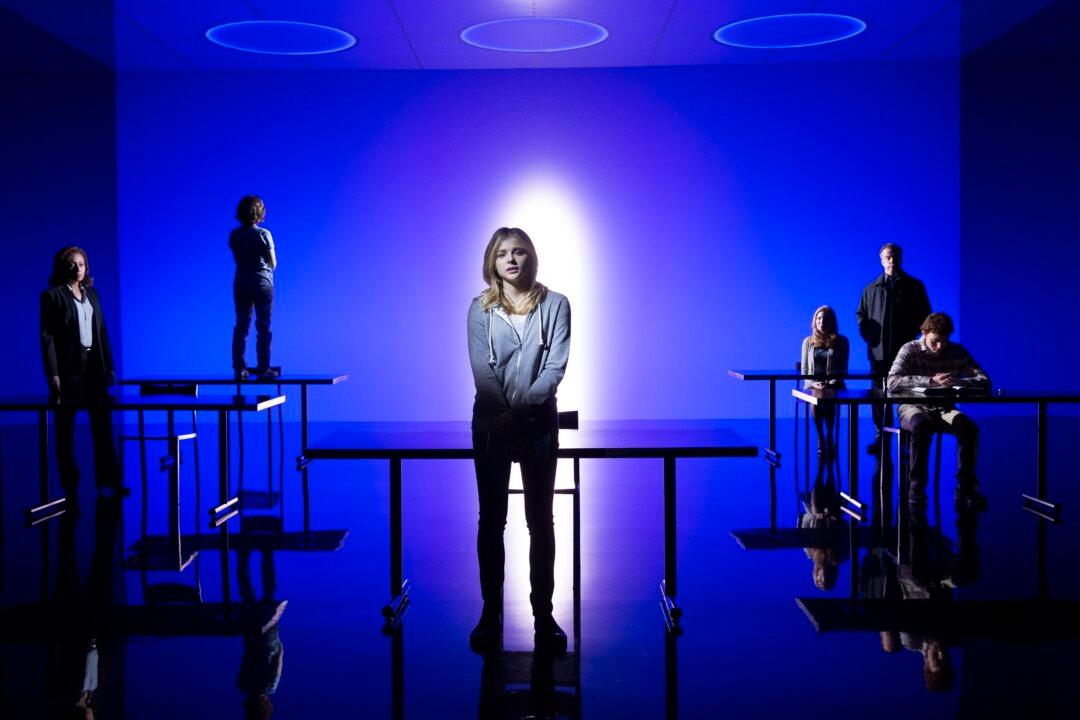NEW YORK—Memory and perception can be very selective—a point brought home in the absolutely gut-wrenching “The Library” by Scott Z. Burns, now at The Public Theater.
The play begins in the immediate aftermath of a shooting in a high school library, which left numerous students critically wounded and killed. Sixteen-year-old Caitlin Gabriel (Chloë Grace Moretz) was one of the lucky ones, surviving a shotgun blast to the chest, while her friend sitting beside her was among the dead.
While Caitlin is in surgery and during her initial recovery period when she’s unable to talk, other survivors are already speaking to the authorities and the media. These include Ryan Mayes (Daryl Sabara) who recalls Caitlin telling the gunman, after he pointed a shotgun at her, where some of the other students were hiding.
By the time Caitlin has recovered enough to speak, she has already been tried and convicted by the media and the public, despite her repeated denials she said any such thing.
Further inflaming the situation is Caitlin’s recollection of hearing someone else tell the gunman what he wanted to know. This voice was coming from a group of students who were praying during the carnage.
This viewpoint does not sit well with those following the already existing narrative, particularly since one of the students killed in that group, Joyce Sheridan, has become a symbol of hope and remembrance.
Joyce has achieved this status thanks to the tireless efforts of her grieving mother Dawn (Lili Taylor), who already has gone on record as forgiving Caitlin for what she said.
As the deceased Joyce becomes a media celebrity, Caitlin finds herself completely ostracized. Her friends desert her; her fellow students don’t want her to return to school; she’s attacked mercilessly on the Internet.
Everyone she asks to believe her—from her parents (Michael O’Keefe, Jennifer Westfeldt) to one of the community church leaders (Ben Livingston)—reacts with skepticism at best and condescension at worst.
Things aren’t helped by the fact Caitlin knew the gunman prior to the shootings and lied about their relationship to the police.
Caitlin is also denied survivor benefits from a not-for-profit group set up to help the victims and their families. Her parents are told that if Caitlin admits to telling the gunman where the students were hiding, they might be willing to reconsider the family’s application—all in the name of closure.
Tautly written by screenwriter Burns, and just as tightly directed by Steven Soderbergh, the play is a gripping indictment of our 24-hour news-cycle society, where stories are packaged and released long before all the facts are in.
This is illustrated in a meeting Dawn has with a publisher (David L. Townsend) about a book deal, and he mentions how fast “we move from tragedy to tragedy.”
Also telling are the surgical team’s comments heard during Caitlin’s various operations. These go from asking what happened when she’s first brought in, to commenting on what she supposedly said, to finally saying the entire matter should be left alone.
Burns does not take sides here; instead he shows how people take what they need from such incidents in order to move on. Some need religious faith, others a firm belief in the truth, or yet others, as in the case of Caitlin’s parents, an attempt to fix what’s broken in their own lives.
The script also reflects political reality in regard to how people in authority deal with the importance of public perception. There are also references to how easy it can be for some people to purchase guns and other instruments of violence.
Moretz is superb as Caitlin, a high school sophomore suddenly thrust into the spotlight and trying her best to get her side of the story out to a world that really doesn’t want to hear it.
Taylor is very good as Dawn Sheridan, a woman who uses her own faith to keep the memory of her daughter alive. It’s a role that could very easily have been simply a caricature, but Burns, Soderbergh, and Taylor ensure that this is not the case.
O’Keefe does a good job as Caitlin’s flawed father, who wants the best for his daughter but questions her choice of the safety net she has found in order to try to heal.
Westfeldt is okay as Caitlin’s mom, who just wants the entire matter to go away.
Tamara Tunie is good as one of the detectives on the case, and Sabara powerfully delivers in a crucial scene as well offering a chilling turn as the gunman.
Riccardo Hernandez’s stark scenic design works well, particularly in the design of the library and operating room; lighting effects by David Lander are striking at different points, and sound design by Darron L West and M. Florian Staab is quite powerful.
Pulling one right into the story and without an ounce of fat in the text, “The Library” offers a sobering look at society today. It’s a play that should be seen by as wide an audience as possible.
“The Library”
The Public Theater
425 Lafayette Street
Tickets: 212-967-7555 or visit publictheater.org
Running Time: 1 hour, 35 minutes
Closes: April 27
Judd Hollander is the New York correspondent for the London publication The Stage.





